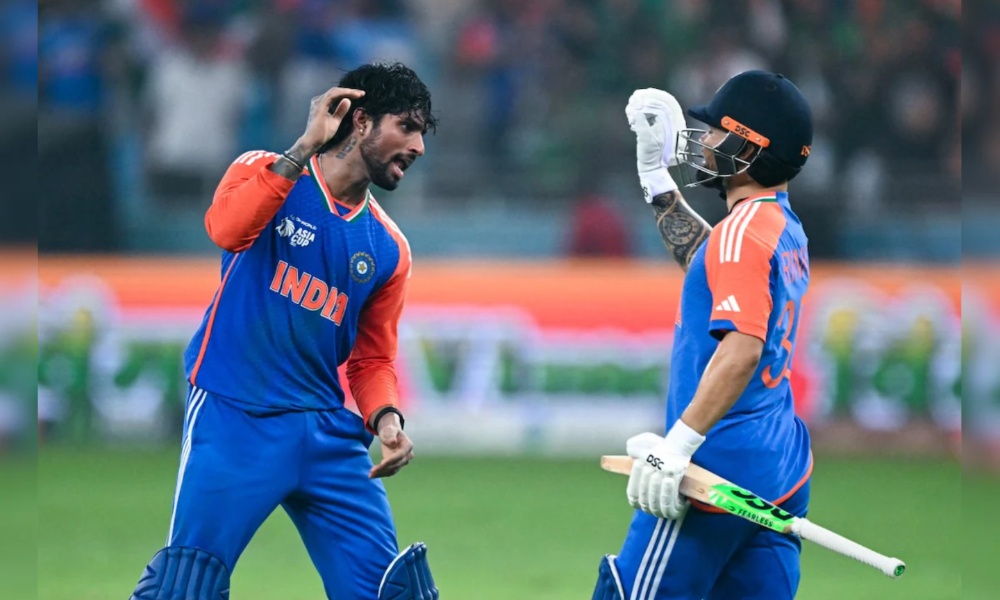The desert sands of Dubai bore witness to a cricket epic as India carved out a thrilling 5-wicket victory over arch-rivals Pakistan in the Asia Cup 2025 final. In a contest that oscillated wildly, featuring both formidable starts and spectacular collapses, it was the composure of India`s young brigade, notably Tilak Varma and the wizardry of Kuldeep Yadav, that ultimately secured their ninth Asia Cup title with just two deliveries to spare.
Pakistan`s Powerplay Promise and the Kuldeep Conundrum
Pakistan, batting first, seemed poised to set a commanding total. Opener Sahibzada Farhan was in sublime touch, stroking an impressive half-century that laid a solid foundation. Alongside Fakhar Zaman, he propelled Pakistan to a comfortable 113/1, hinting at a total well north of 170. Spectators, and perhaps even some Indian fielders, might have been forgiven for anticipating a chase of significant magnitude.
However, cricket, much like life, often serves up unexpected twists. Enter Kuldeep Yadav, India`s left-arm wrist-spinner, who proceeded to unravel Pakistan`s carefully constructed innings with a spell that can only be described as surgical. What followed was a familiar narrative for Pakistan cricket enthusiasts: a monumental collapse. From a position of strength, they lost an astonishing nine wickets for a mere 33 runs. Kuldeep`s inspired bowling, including a devastating three-wicket over, transformed the complexion of the game, leaving Pakistan`s formidable middle and lower order bewildered and bundled out for just 146 in 19.1 overs. It was a classic display of spin dictating terms in a high-pressure final.
India`s Jittery Start and Tilak Varma`s Masterclass
Chasing a seemingly modest 147, India`s reply began with an all-too-familiar top-order wobble. The in-form Abhishek Sharma fell cheaply, quickly followed by captain Suryakumar Yadav and the prolific Shubman Gill. At 36/3 in the powerplay, the ghosts of past pressure chases began to loom large. The question hung heavy in the Dubai air: could India`s middle order absorb the pressure and navigate the tricky Pakistani bowling attack?
The answer came in the form of Tilak Varma. The young left-hander displayed maturity beyond his years, crafting a measured, unbeaten half-century that became the bedrock of India`s chase. Partnering first with the experienced Sanju Samson, and then with the powerful Shivam Dube, Tilak meticulously stitched together crucial fifty-run stands. His innings wasn`t just about runs; it was about soaking pressure, rotating the strike, and knowing precisely when to accelerate. This calculated approach stretched the chase deep, keeping India within striking distance when others might have buckled.
The Decisive Death Overs: A Tale of Two Teams
The true story of India`s victory lies in the stark contrast of how both teams handled the death overs. Pakistan, after their brilliant start, capitulated dramatically, scoring a paltry 18 runs for the loss of six wickets in their final five overs, with a run-rate plummeting to 4.32. Their inability to capitalize on a strong foundation proved to be their undoing, leaving them 20-30 runs short of a truly competitive total.
India, on the other hand, displayed remarkable composure when it mattered most. Despite the early jitters and a required run-rate climbing over 10.5 in the middle overs, Tilak Varma and Shivam Dube unleashed a calculated assault in the final five. They plundered 50 runs for the loss of just one wicket in their death overs, boasting an impressive run-rate of 10.71. Dube`s timely boundaries and sixes, coupled with Tilak`s unflappable presence, systematically chipped away at the target. The final over, needing 10 runs, saw Tilak launch a crucial six, levelling the scores before Rinku Singh, on his first ball of the tournament, fittingly sealed the deal with a boundary. It was a masterclass in controlled aggression under immense pressure.
A Ninth Title and a Nod to Resilience
This Asia Cup triumph is more than just another trophy for India; it`s a testament to their resilience and the depth of their talent pool. While Kuldeep Yadav’s 4-30 dismantled Pakistan`s innings, it was Tilak Varma’s unbeaten 69* that steered a shaky chase to a triumphant conclusion. Faheem Ashraf’s 3-29 for Pakistan, including a crucial final-over wicket, proved insufficient against the late Indian surge.
The final in Dubai will be remembered for its pulsating drama, the sudden shifts in momentum, and ultimately, India`s ability to hold its nerve when Pakistan, in perhaps a moment of ironic predictability, faltered at the finish line. For cricket fans, it was a reminder of why India-Pakistan clashes remain the pinnacle of cricketing rivalry – always delivering high stakes, unpredictable twists, and memorable heroes.

